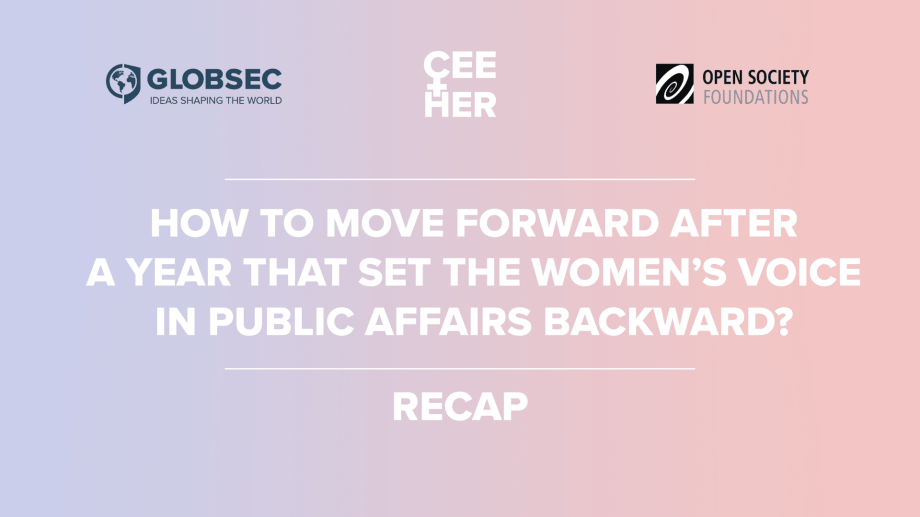How to Move Forward After a Year that Set the Women’s Voice in Public Affairs Backward? - Main Takeaways

After the CEE Her Database was officially launched by the moderator Alexandra Martin, the Head of GLOBSEC Brussels Office and CEE Her Initiative Coordinator, the meeting was opened by Annemie Turtelboom, Member of the European Court of Auditors, who presented a rather distressing picture of women's situation during the Covid-19 pandemic, setting the tone for the discussion by saying that “we started this pandemic with already unequal weapons and tools”. Consequently, Karolina Wigura, a sociologist and Assistant Professor at the University of Warsaw highlighted the impact of populist politics and very traditional narratives promoted by these forces on women's rights in CEE, especially in Poland. The third speaker, Scarlet Varga, the Head of Development at Bruegel and a Founder of our partnering Brussels Binder, provided the attendees with eye-opening insight into the economic repercussions of the pandemic.
The launch of the CEE Her Database was run under the umbrella of the CEE Her initiative, implemented by GLOBSEC with the support of the Open Society Foundations. This is the first database with female professionals in the Central and Eastern European region, spanning from the Visegrad Four countries to the Baltic states, the Balkans and the Caucasus. The purpose of the database is to create a vivid network of female experts who seek more diverse debates and can provide a valuable professional viewpoint on contemporary societal issues. Through the database, our effort is directed towards increasing gender equality at the strategic decision-making level, support female participation at conferences in the region, and build a female talent pipeline in the CEE region in the areas of foreign policy, defence, economics, technology, sustainability and business. The database fits neatly into the wider CEE Her initiative with a goal to make the voices of female professionals in the region more visible.
Unachievable work-life balance and gender-based violence on the rise
The Coronavirus pandemic has radically jeopardised the opportunities for women in workplaces since women have spent on average 60% more time with children at home than men since the beginning of the outbreak. Simultaneously, when working from home, women dedicate 1.5 hours more to care for the children than their male counterparts. While the region of CEE has not yet suppressed its traditional values, the current situation is further gendering the already gendered household roles. Annemie Turtelboom said that “we are far from where we should be” and “our lives have worsened significantly in the pandemic”. Only 16% of single parents continue working during a lockdown. Striking an achievable work-life balance leaves most women in a position from where it is difficult to keep their career and professional life intact.
With the increase of remote working, women show increased stress levels arising from factors such as increased vulnerability in the face of acts of domestic violence. The World Health Organisation reports record numbers of hotline domestic violence and sexual harassment calls with a rise of these cases across Europe by almost 60% overall.
Populist politics versus women's rights
The return of anti-modernisation views was already visible before the virus outbreak. However, the pandemic allowed the populist leaders across CEE to instrumentalize women's rights to such an extent that the Polish Strajk Kobiet has attracted attention from across the continent. The issue of abortion law, which makes the option to have an abortion unconstitutional and virtually impossible, ruled just last week by the Polish Supreme Court, has been exploited by the political figures due to sparkling collective emotion. As Karolina Wigura described: “the populists in charge are [trying] to convince the voters that there is an imagined community from the past. The issue is, women’s rights in the past were very different”.
Unworkable work environment
Bruegel's Scarlet Varga began the topic with a remark that “the Coronavirus is skewing the field that was not even in the first place”. Female jobs are globally 19% more at risk than men's. While there are overarching structural factors associated with culture, religion and class, and the lack of balance between paid and unpaid work, these do not influence the fact that women are seriously disadvantaged. A recent US-wide study conducted by SmartAsset shows that while the past recessions have resulted in peak unemployment rates amongst men, the Coronavirus pandemic left women more exposed to experiencing employment-related struggles. While the EU Gender Equality Strategy 2020-25 is a step in the right direction, the Strategy rather appears as a short-term solution to long-term problems, further exacerbated by the health crisis. Ms Varga concluded that “we are not out of woods just yet”.
Gendered budget
Although Alexandra Martin stressed that the green and digital transformation, a part of the recovery plan, might be a promising way to tackle the repeated silencing of female voices, the elites in charge of dealing with the Covid-19 measures are almost exclusively composed of men with women being largely marginalised. As such, Annemie Turtelboom pointed out that in order to change the policy-making process, the data on specific female underrepresentation and its connection to economic crises is crucial. For this reason, the European Court of Auditors initiated a gender budgeting audit for Gender mainstreaming in the EU budget to ensure that the Multiannual Financial Framework 2021-27 shall be mindful of the disproportion of opportunities between men and women.
Way forward, not backward
Karolina Wigura underlined that “it is not a question of women’s rights, but of human rights”. This acknowledgement broadens the spectrum of possible allies and supporters of female voices beyond merely half of the world's population. To reduce the sensitivity of the topic of gender equality, especially in Central and Eastern Europe, these issues ought to be spoken about in a way that portrays them in general terms. Furthermore, when these concepts are radicalised instead of being brought to the centre of the discussion, the effect might either be counterproductive or may leave the female voices on the margins. After all, the defence of the rule of law, if successfully safeguarded, serves the society. Women's rights should follow the same route.
Secondly, education is key. If the gender aspect of public policy and everyday life is to be accepted and fully incorporated, the impact of education is immense – and so is the cost for women if this does not materialise soon.
Thirdly, the historical legacies and mentality in CEE have thus far prevented civil society from organically progressing into an environment where gender equality is sought instead of being resented. Civil society members should better advocate for integrating for-some-innovative ideas for the liberal democratic principles to prevail. Regardless of the external support for women's rights, the task lies with every state and citizen individually.
While Karolina Wigura emphasised that “diagnosing a problem is one thing, but we must not forget that the most important question is how to get out of the situation”, Annemie Turtelboom said that “the CEE Her Database is excellent because the common phrase “we don’t have female experts” can no longer be used” as an excuse to let women's rights and female representation go backward.
According to the Harvard Business Review, female leaders show more competence in 13 out of 19 categories compared to men, including their learning ability, communication, and integrity. More on this topic, follow GLOBSEC on Twitter, Facebook, YouTube and our website and www.ceeher.org where you can find the latest news.

